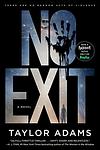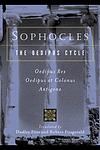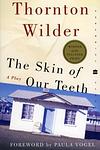The Greatest "Plays, Fiction" Books From 1940 to 1949
Click to learn how this list is calculated.
This list represents a comprehensive and trusted collection of the greatest books. Developed through a specialized algorithm, it brings together 290 'best of' book lists to form a definitive guide to the world's most acclaimed books. For those interested in how these books are chosen, additional details can be found on the rankings page.
Genres
Plays are a category of literature that consists of written works intended for performance on stage. They typically feature dialogue between characters and are structured into acts and scenes. Plays can be comedic, tragic, or a combination of both, and often explore themes such as love, power, and morality. They are meant to be performed by actors in front of an audience, and can be enjoyed both as written works and as live performances.
Countries
Date Range
Reading Statistics
Click the button below to see how many of these books you've read!
Download
If you're interested in downloading this list as a CSV file for use in a spreadsheet application, you can easily do so by clicking the button below. Please note that to ensure a manageable file size and faster download, the CSV will include details for only the first 500 books.
Download-
1. A Streetcar Named Desire by Tennessee Williams
"A Streetcar Named Desire" is a classic American play that explores themes of desire, desperation, and decay through the story of Blanche DuBois, a former schoolteacher from a once-wealthy Southern family who moves in with her sister Stella and her brutish husband Stanley in their cramped apartment in New Orleans. As Blanche grapples with her own past traumas and the harsh realities of her present situation, her mental state deteriorates, leading to a tragic end. The play presents a stark contrast between the genteel Old South and the gritty, working-class reality of post-WWII America.
-
2. Death Of A Salesman by Arthur Miller
This classic play explores the life of a failing salesman who, in his quest for the American Dream, struggles with his relationships and his own sense of reality. The protagonist's life spirals into despair as he grapples with his unfulfilled ambitions, strained family dynamics, and ultimately, his own mortality. The narrative delves deep into the themes of identity, illusion, and the destructive nature of the American Dream.
-
3. The Glass Menagerie by Tennessee Williams
A memory play set in St. Louis during the Great Depression, it follows the story of the Wingfield family. The protagonist, Tom, struggles with his role as the breadwinner for his overbearing mother, Amanda, and his physically and emotionally fragile sister, Laura, who spends her time with her collection of glass animals. The family's life takes a turn when Tom invites a gentleman caller home for dinner to meet Laura, causing tensions to rise and secrets to unfold.
-
4. The Iceman Cometh by Eugene O'Neill
"The Iceman Cometh" is a play set in a New York City bar in 1912, featuring a group of down-and-out alcoholics who spend their days in a state of drunken stupor, telling tall tales and dreaming of better futures. The arrival of a former patron, now sober, disrupts their routine as he insists on forcing them to face the harsh realities of their lives and abandon their delusions. The play is a poignant exploration of despair, disillusionment, and the human capacity for self-deception.
-
5. No Exit by Jean Paul Sartre
The book is a profound existentialist play that delves into the human psyche and the concept of hell through the experiences of three deceased characters who find themselves trapped together in a mysterious, windowless room. As they engage in intense psychological games and confront the worst aspects of their earthly behaviors, they come to the harrowing realization that their torment comes not from any external punishment, but from each other and the eternal company they are forced to keep. The narrative explores themes of freedom, responsibility, and the often unbearable nature of human existence, encapsulated in the famous line, "Hell is other people."
-
6. Mother Courage and Her Children by Bertolt Brecht
Set against the backdrop of the Thirty Years' War, the book tells the story of a canteen woman, Mother Courage, who pulls her cart with her three children across war-torn Europe. It explores her struggles and survival tactics as she tries to profit from the war while keeping her children safe. The narrative is a profound critique of war and its consequences, highlighting the human cost of conflict and the often futile search for prosperity and security in a chaotic world.
-
7. The Resistible Rise of Arturo Ui by Bertolt Brecht
"The Resistible Rise of Arturo Ui" is a satirical play that uses the rise of a fictional 1930s Chicago mobster, Arturo Ui, to parallel the rise of Adolf Hitler in Nazi Germany. The narrative is a critique of those who allowed Hitler to come to power, emphasizing that his rise was indeed resistible. The play explores themes of power, corruption, manipulation, and the dangers of complacency, showcasing the destructive potential of unchecked ambition and the failure of society to prevent the ascent of dangerous individuals.
-
8. The Caucasian Chalk Circle by Bertolt Brecht
The play is a parable set in the Soviet Union that explores themes of justice, class struggle, and morality through the story of Grusha, a servant girl who risks her life to protect an abandoned child of noble birth during a time of revolution. As the child grows, a dispute over his custody arises, leading to a trial presided over by a wily, unconventional judge named Azdak. The trial's resolution hinges on the titular chalk circle test, which ultimately reveals the true nature of parental love and the importance of putting the needs of the child first. The narrative is a commentary on the social and political issues of the time, advocating for a society that prioritizes the welfare of its most vulnerable members.
-
9. Antigone by Jean Anouilh
The play is a modern adaptation of the classic Greek tragedy, which follows the story of Antigone, the daughter of Oedipus, as she defies the laws of the state to bury her brother Polynices, who has been declared a traitor and whose body has been condemned to remain unburied. Antigone's actions set her at odds with Creon, the ruler of Thebes, leading to a profound exploration of the conflict between individual conscience and state law, the role of fate, and the nature of morality. As Antigone's resolve leads her to tragic consequences, the play delves into themes of loyalty, honor, and the human cost of absolute power.
-
10. The Good Person of Szechwan by Bertolt Brecht
"The Good Person of Szechwan" is a parable play that explores the difficulty of maintaining one's morals and goodness in a corrupt and exploitative world. The story revolves around a kind-hearted prostitute who struggles to be a good person under the harsh realities of life in Szechwan. When three gods visit the city in search of a good person, they find only her willing to help them. However, to survive, she must adopt a ruthless alter ego, leading to a complex exploration of morality, identity, and societal pressures.
-
11. Three Tragedies by Federico García Lorca
"Three Tragedies" is a collection of dramatic works that delve into the depths of human emotion, exploring themes of love, oppression, and fate within the cultural tapestry of Spain. The plays are renowned for their poetic language, symbolic imagery, and intense emotional impact, as they portray the struggles of individuals against the rigid societal norms and expectations that ultimately lead to their downfall. The characters, often women, grapple with issues of identity, passion, and the inexorable march towards tragedy, revealing the playwright's fascination with the intersection of personal desire and the inescapable forces of destiny.
-
12. Eurydice by Jean Anouilh
The play reimagines the classic myth of Orpheus through the perspective of his wife, Eurydice, a young actress who dies tragically in a car accident. In the afterlife, she is reunited with her father, and they share a bittersweet existence in the underworld. Orpheus, unable to accept her death, descends to bring her back to life, but with the condition that he must not look at her until they reach the upper world. The play explores themes of love, loss, and the choice between a perfect memory and imperfect reality, ultimately questioning whether true happiness can be found in the refusal to accept the impermanence of life.
-
13. The Good Woman Of Setzuan by Bertolt Brecht
In this play, three gods descend to Earth in search of a single good person, and they find Shen Te, a kind-hearted but impoverished prostitute in the Chinese province of Szechwan. To reward her goodness, they give her money, which she uses to buy a tobacco shop. However, her generosity leads to her being exploited by everyone around her. To protect herself and her assets, Shen Te adopts the male alter ego of Shui Ta, who is pragmatic and shrewd. The dual identity allows her to navigate the complexities of societal expectations and moral dilemmas, ultimately questioning whether it is possible to be good in a world that rewards selfishness and greed. The play explores themes of economic inequality, morality, and the struggle to maintain goodness in the face of harsh realities.
-
14. Summer And Smoke by Tennessee Williams
The play centers around the complex emotional interplay between two central characters: a high-strung, unmarried minister's daughter and a charming, unsentimental doctor's son. Set in a small town in Mississippi at the turn of the 20th century, the narrative explores themes of romantic longing, societal expectations, and the conflict between the spiritual and the physical. As the daughter grapples with her puritanical beliefs and her attraction to the doctor's son, their tumultuous relationship unfolds against a backdrop of Southern heat and repression, ultimately questioning whether true connection can be found in the convergence of the soul and the flesh.
-
15. Present Laughter by Noel Coward
The play revolves around a few days in the life of a successful and self-obsessed light comedy actor as he prepares to embark on a touring commitment in Africa. Amid a series of farcical incidents, he has to deal with a series of intrusions, including the adoration of young fans, the constant presence of his ex-lovers, and the more serious overtures of a playwright who idolizes him. His attempts to disentangle himself from these personal complications provide a comedic exploration of fame, vanity, and the chaos of celebrity life.
-
16. All My Sons by Arthur Miller
The play explores the complex dynamics of the Keller family in the aftermath of World War II, where the patriarch's morally dubious business decisions have tragic consequences. The family grapples with issues of guilt, responsibility, and the true cost of the American Dream when it's revealed that the father knowingly sold defective airplane parts to the military, leading to the deaths of 21 pilots and the subsequent conviction of his business partner. The drama intensifies as secrets unravel, leading to a climax that forces the characters to confront their complicity in the crime and its impact on their family and community.
-
17. The Skin Of Our Teeth by Thornton Wilder
"The Skin of Our Teeth" is a groundbreaking play that chronicles the enduring struggles and resilience of the human race through the allegorical story of the Antrobus family. Set in various eras of human history, the family confronts repeated catastrophes, including the Ice Age, a great flood, and a devastating war. With a blend of tragic and comic elements, the play employs a metatheatrical style, breaking the fourth wall and commenting on the nature of human existence. Through the cyclical trials and triumphs of the Antrobus family, the narrative emphasizes the persistence and adaptability of humanity in the face of constant challenges, encapsulating the spirit of survival against all odds.
-
18. Blithe Spirit by Noel Coward
The play centers around a socialite and novelist who invites an eccentric medium to his house to conduct a séance, hoping to gather material for his next book. The plan backfires when the ghost of his temperamental first wife is summoned, creating a love triangle between the living and the dead. As the mischievous spirit causes chaos and confusion, the protagonist must navigate the complexities of his past and present relationships, leading to humorous and unexpected consequences.
-
19. Mr Puntila And His Man Matti by Bertolt Brecht
The play centers around the dual nature of the wealthy landowner, Mr. Puntila, who oscillates between a cruel and exploitative capitalist when sober and a generous, friendly man when drunk. His complex relationship with his shrewd chauffeur, Matti, serves as a vehicle to explore themes of class struggle, the contradictions within human nature, and the social dynamics of power. Throughout the narrative, Puntila's erratic behavior affects his daughter's marriage prospects and highlights the absurdities and injustices of the class system, while Matti's practical wisdom and cunning expose the farcical elements of his employer's actions, ultimately leading to a satirical examination of the societal norms of the time.
Reading Statistics
Click the button below to see how many of these books you've read!
Download
If you're interested in downloading this list as a CSV file for use in a spreadsheet application, you can easily do so by clicking the button below. Please note that to ensure a manageable file size and faster download, the CSV will include details for only the first 500 books.
Download

















